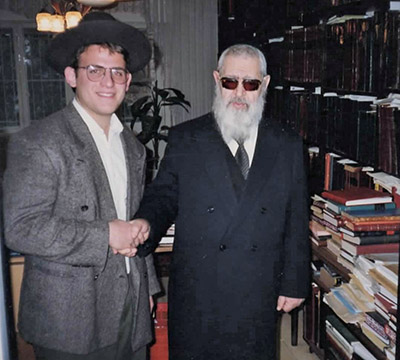
In addition to my work at the Young Israel of Memphis, I’m also privileged to teach Torah to a great group of students at Memphis’ Cooper Yeshiva High School for Boys. With the yom tovim behind us, recruiters from yeshivot in Israel have already begun visiting the school to pitch their programs to our 12th graders.
To yeshiva high school seniors across the country contemplating the year they may soon spend in Israel, I offer one piece of advice: Some experiences can only take place in Israel—so while you’re there, please don’t let those unique opportunities slip through your fingers!
Here is one such opportunity I experienced while studying in Israel the year after I graduated high school: It was early 1993; I was 18 years old, and with friends from across the US, I was enjoying a great year of Torah study at Yeshiva Chofetz Chaim in Jerusalem.
One night, a Sephardic friend from California came back to the dormitory with an important piece of information he had somehow picked up. Rabbi Ovadia Yosef (1920-2013, the highly-revered former Chief Sephardic Rabbi of Israel) was a bit under the weather, and his doctors told him to stay home and rest that week. However, Rabbi Yosef still wanted to pray with a proper minyan. As such, for the next number of days, he would be hosting a minyan in his home.
We figured that the least crowded minyan would be Shacharit, as Rabbi Yosef liked to offer those morning prayers at sunrise. Joining Rabbi Yosef in his house for that minyan would allow us a once-in-a-lifetime opportunity to spend time in close proximity to that world-famous Torah scholar. A bunch of us immediately decided to order a taxi for the following morning. We set our alarm clocks to go off before the crack of dawn, and we went to sleep excited about joining Rabbi Ovadia Yosef’s home-based sunrise minyan the next morning.
Everything went as planned, and our taxi had no trouble navigating Jerusalem’s empty pre-sunrise streets. Before long, three of my friends and I—together with about 15 other men—found ourselves donning tefillin on our arms and heads in Rabbi Yosef’s living room. As I waited for the prayers to begin, I looked around and was amazed by the sheer number of well-used seforim (Jewish books) that lined each wall. Every one of them contained one or more bookmarks! There were even piles of seforim stacked all over the room.
But where was Rabbi Yosef? Then I saw him sitting on a chair across the room. Were it not for the tell-tale tinted glasses that always adorned his face, I don’t think I would have recognized him. In all the pictures I had ever seen of Rabbi Ovadia Yosef, he wore the distinctive turban and gold-leafed robes of the Rishon LeTzion (Sephardic Chief Rabbi). Apparently, he only wore that regal-looking outfit in public. In his own home, however, Rabbi Yosef wore a regular yarmulka and a dark frock coat, shirt, tie and slacks—looking no different than a head of a Lithuanian-style Ashkenazi yeshiva.
When our prayers came to a close, our minyan formed a line to greet Rabbi Yosef, wish him well and receive a short blessing. As I waited my turn on line, I was surprised to see all the Sephardic men ahead of me not only shake Rabbi Yosef’s hand, but kiss it as well. I quickly realized that Sephardic Jews venerate their rabbinic leaders much differently than what I was used to in my Ashkenazic world.
When my turn came, I only shook Rabbi Yosef’s hand, and explained that this was all I was used to in America—and he smiled at my comment. I wished him a speedy recovery, and I received a quick and friendly blessing in return. Finally, I asked a family member at his side if he could take a picture of me together with the famed Rabbi Yosef. He happily agreed—as long as I was able to turn off the camera’s flash. After all, Rabbi Yosef wore his trademark tinted glasses because his eyes were overly sensitive to light. Thankfully, my trusty 35mm camera cooperated, producing a memento from that early morning minyan that I’ll always hold dear.
Dear 12th graders, the privilege of a gap year in Israel is truly a once-in-a-lifetime gift. It will offer you the opportunity to spend time in places and with personalities that are unique to Israel. Those “only in Israel” encounters can leave you with powerful—and memorable—Jewish experiences. Please make the most of your time studying Torah in Israel!
By Rabbi Akiva Males
Rabbi Akiva Males serves as the rabbi of the Young Israel of Memphis (Tennessee). He can be reached at rabbi@yiom.org.









